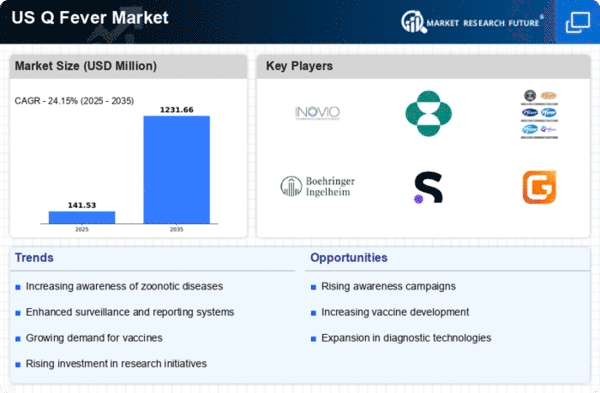Enhanced Research Funding
In recent years, there has been a marked increase in research funding directed towards infectious diseases, including q fever. Government agencies and private organizations are allocating more resources to understand the epidemiology and pathogenesis of q fever, which is expected to drive innovation in the q fever market. For instance, funding for studies related to vaccine development and novel therapeutic approaches has surged, with estimates suggesting a growth of over 20% in research grants dedicated to this area. This influx of financial support not only fosters advancements in treatment options but also encourages collaboration among academic institutions, pharmaceutical companies, and public health organizations, thereby strengthening the q fever market.
Growing Veterinary Awareness
The q fever market is also influenced by increasing awareness among veterinarians regarding the disease's impact on animal health and public safety. As veterinarians play a crucial role in diagnosing and managing q fever in livestock, their enhanced understanding of the disease is likely to lead to improved reporting and management practices. This shift is particularly relevant given that livestock are significant reservoirs for Coxiella burnetii. Consequently, the veterinary sector's proactive approach to disease management may result in a decrease in transmission rates, thereby positively affecting the q fever market. Moreover, educational initiatives aimed at veterinarians are expected to further bolster the industry's growth by promoting best practices in disease prevention and control.
Rising Incidence of Q Fever Cases
The q fever market is experiencing growth due to a notable increase in reported cases across the United States. Recent data indicates that the incidence of q fever has risen by approximately 15% over the past five years, prompting heightened awareness among healthcare professionals and the public. This rise is attributed to factors such as environmental changes and increased exposure to livestock, which are primary reservoirs for the causative agent, Coxiella burnetii. As more cases are diagnosed, the demand for effective diagnostic tools and treatment options in the q fever market is likely to expand. Furthermore, the increased burden on healthcare systems may lead to greater investment in research and development, ultimately benefiting the q fever market as a whole.
Technological Advancements in Diagnostics
The q fever market is poised for growth due to ongoing technological advancements in diagnostic methods. Innovations such as polymerase chain reaction (PCR) testing and serological assays have significantly improved the accuracy and speed of q fever diagnosis. These advancements are crucial, as timely diagnosis is essential for effective treatment and management of the disease. The market for diagnostic tools is projected to expand, with estimates indicating a growth rate of around 10% annually. As healthcare providers increasingly adopt these advanced diagnostic technologies, the q fever market is likely to benefit from enhanced patient outcomes and reduced healthcare costs associated with delayed diagnosis.
Increased Regulatory Support for Vaccination
The q fever market is likely to benefit from increased regulatory support for vaccination initiatives. Regulatory agencies are recognizing the importance of preventive measures in controlling infectious diseases, including q fever. Recent policy changes have facilitated the development and approval of vaccines aimed at reducing the incidence of q fever in both humans and animals. This regulatory focus is expected to stimulate investment in vaccine research and development, potentially leading to the introduction of new products in the q fever market. As vaccination rates increase, the overall burden of the disease may decrease, further driving growth in the q fever market.
















